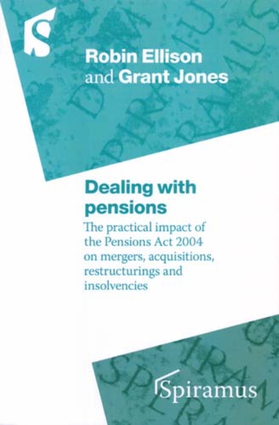Overview
Essential reading for trustees of pension schemes, company directors, managing directors, finance directors, company secretaries, actuaries, lawyers, accountants, insolvency practitioners.
The Pensions Act 2004 provides additional protection for members of defined benefit occupational pension schemes. In doing so it establishes both a pensions regulator and a pensions protection fund. The new rules impose funding obligations on employers which, it was thought by the legislators, employers would attempt to evade.
The legislation therefore includes anti-avoidance provisions, the knock-on effects of which will (1) radically change the way in which companies are bought, sold, restructured and wound-up (whether insolvent or solvent) and (2) create complex dilemmas for pension fund trustees and their advisers.
The anti-avoidance provisions of sections [35 and 39] are intended to protect pension members' benefits, whilst ensuring that it blocks abuses whereby pension liabilities can be offloaded onto the Pension Protection Fund. The provisions however may lead to unintended consequences for some businesses in the same group of companies, in situations where no abuse has taken place, for example: difficulties for private equity providers who thus far have viewed their investee companies as stand-alone entities which can be allowed to become insolvent if they fail. Following the legislation, where private equity provider invests in a company with a defined benefit which later falls into insolvency, clause 39 would require other companies invested in by the private equity provider paying towards the deficit that company’s scheme.
difficulties for overseas investors who find it hard to quantify the pension liabilities of UK businesses they acquire, especially if the liabilities of one infect the liabilities of otherwise unconnected companies, including those without any defined benefit pension arrangements.
difficulties for trustees who may be intimidated from assuming appointments as trustees, and/or increasing the cost of trusteeship
difficulties for employers wishing to establish or continue defined benefit pension schemes
Author Biography
Grant Jones is an insolvency accountant partner with Cooper Parry LLP. He also practises as an attorney, in-house with a UK hedge fund and as a consultant to the UK firm of Taylor Vinters and the Gibraltar firm of Ellul & Co, as well as having his own arbitration practice. He is a member of the Governing Council of the ICAEW, President of the London Society of Chartered Accountants and a Special Professor of Law at Nottingham University.
Robin is Head of Strategic Development for Pensions for Pinsent Masons solicitors.


